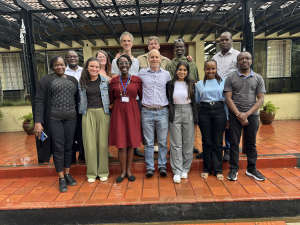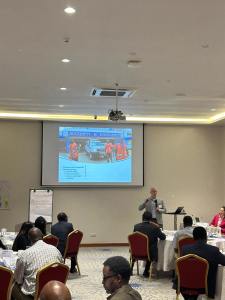I am excited to go back to Kenya to teach the BEC course and meet with local leaders to assess it's sustainability. The WHO/ICRC Basic Emergency Care (BEC) course delivers essential, lifesaving training for managing acute illness and injury in low-resource settings. After a successful evaluation of the course among recent medical school graduates in Kenya, our team is working to scale its impact by integrating BEC into the final-year curriculum of medical schools—and expanding access to nurses and other frontline providers.
This project aims to build a sustainable, nationwide emergency care training model by:
• Potentially embedding the BEC course in medical and nursing school curricula,
• Training and certifying a national network of BEC instructors, and
• Convening a stakeholder meeting in Fall 2025 (which I am grateful for the opportunity to co-facilitate this) to develop a strategic roadmap for implementation.
This meeting will engage leaders in medical education, emergency care, and health systems to:
• Identify barriers and opportunities for national scale-up,
• Evaluate feasibility, cost-effectiveness, and integration across health professions, and
• Define a sustainable model for training Kenya’s next generation of emergency care providers.
Funding Request:
Support from the Doximity Foundation would enable me to travel to Eldoret, Kenya to help lead the national stakeholder meeting and deliver a BEC instructor course—two foundational steps toward a scalable, sustainable emergency care training framework for Kenya.
Medical students, nurses and other frontline providers who will have better access to this training program, to ultimately better serve patients needing emergency medical care.
This stakeholder meeting will lay the groundwork for making the BEC sustainable and accessible to front line providers in Eldoret and surrounding area in Kenya. Further, these events will continue to build friendships and strengthen our multi-national partnerships. We hope to continue to support our EM colleagues in Kenya- as they continue to strengthen their EM system.








Trip Report: Basic Emergency Care (BEC) Implementation in Kenya
I recently returned from Eldoret, Kenya, where our team advanced the next stage of scaling the WHO/ICRC Basic Emergency Care (BEC) course. The trip centered on both capacity building and stakeholder engagement, with the goal of laying the foundation for a sustainable, nationwide emergency care training framework.
Stakeholder Engagement
We convened a stakeholder meeting with approximately 20 healthcare leaders, representing medical education, nursing, emergency care, and health systems. Using a guided implementation and qualitative research strategy, we facilitated structured discussions to align stakeholder interests, assess barriers and opportunities, and prioritize shared goals. The group reached consensus on the importance of making BEC available for both medical and nursing curricula, while also creating a pathway for a current practitioners.
Training & Capacity Building
Alongside the meeting, we conducted a full BEC training for 30 medical students, giving them foundational skills to recognize and manage acute illness and injury in low-resource settings. In addition, we delivered a Training of Trainers (TOT) course for a cohort of nurses and physicians. These new instructors will serve as multipliers, expanding the reach of BEC across health professions and ensuring long-term sustainability.
Impact & Next Steps
The combination of stakeholder alignment and frontline training represents a pivotal step toward regional and hopefully, national scale-up. Our next priorities include supporting the newly trained instructors, piloting curriculum integration in selected institutions, and continuing to engage with healthcare leaders to formalize a sustainable model.